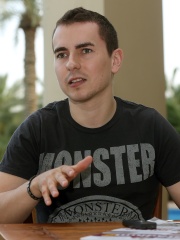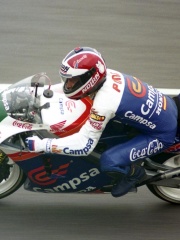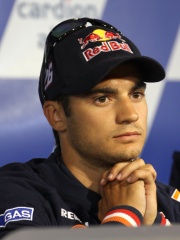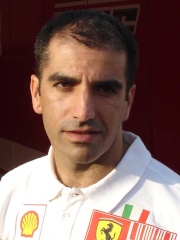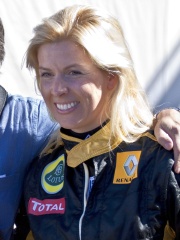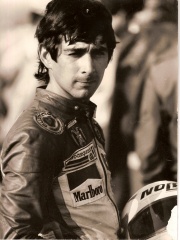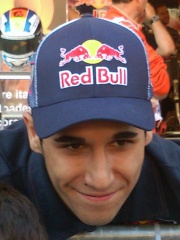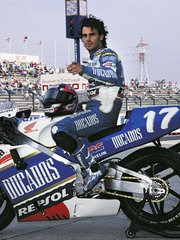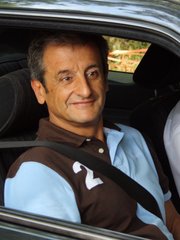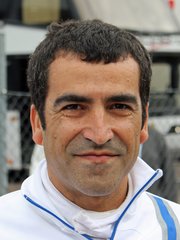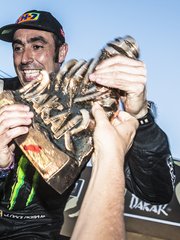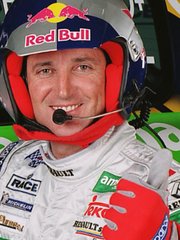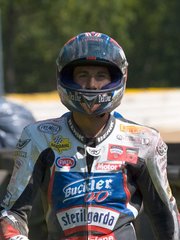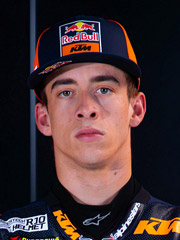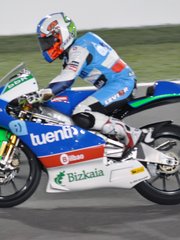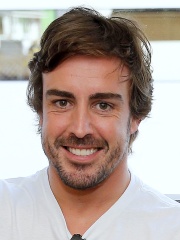
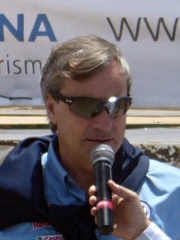
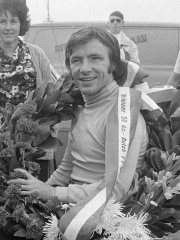
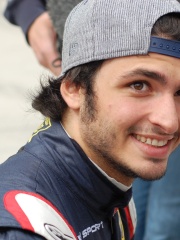
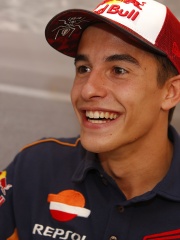
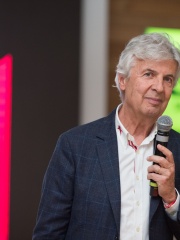
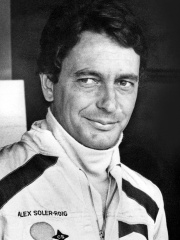

The Most Famous
RACING DRIVERS from Spain
This page contains a list of the greatest Spanish Racing Drivers. The pantheon dataset contains 1,080 Racing Drivers, 62 of which were born in Spain. This makes Spain the birth place of the 6th most number of Racing Drivers behind France, and Germany.
Top 10
The following people are considered by Pantheon to be the top 10 most legendary Spanish Racing Drivers of all time. This list of famous Spanish Racing Drivers is sorted by HPI (Historical Popularity Index), a metric that aggregates information on a biography's online popularity. Visit the rankings page to view the entire list of Spanish Racing Drivers.

1. Fernando Alonso (b. 1981)
With an HPI of 69.33, Fernando Alonso is the most famous Spanish Racing Driver. His biography has been translated into 104 different languages on wikipedia.
Fernando Alonso Díaz (Spanish pronunciation: [feɾˈnando aˈlonso ˈði.aθ] ; born 29 July 1981) is a Spanish racing driver who competes in Formula One for Aston Martin. Alonso has won two Formula One World Drivers' Championship titles, which he won in 2005 and 2006 with Renault, and has won 32 Grands Prix across 22 seasons. In endurance racing, Alonso won the 2018–19 FIA World Endurance Championship and is a two-time winner of the 24 Hours of Le Mans with Toyota, and remains the only driver to have won both the Formula One World Drivers' Championship and the World Sportscar/World Endurance Drivers' Championship; he also won the 24 Hours of Daytona in 2019 with WTR. Born and raised in Oviedo to a working-class family, Alonso began kart racing aged three and won several regional, national and continental titles. He progressed to junior formulae at the age of seventeen, winning the Euro Open by Nissan in 1999 before finishing fourth in International Formula 3000. Alonso signed for Minardi in 2001, making his Formula One debut at the Australian Grand Prix. After a non-scoring rookie season, he joined Renault as a test driver before his promotion to a full-time seat in 2003; he became the then-youngest polesitter and race winner at the Malaysian and Hungarian Grands Prix, respectively, before achieving several podiums across his 2004 campaign. Alonso won his maiden title after winning seven Grands Prix in 2005, becoming the first World Drivers' Champion from Spain and the then-youngest in Formula One history, aged 24. He successfully defended his title from Michael Schumacher in 2006. Alonso moved to McLaren for 2007, finishing one point behind champion Kimi Räikkönen and returning to Renault amidst inter-team tensions. He won multiple races in 2008—including the controversial Singapore Grand Prix—before enduring a winless 2009 campaign. Alonso signed for Ferrari in 2010, finishing runner-up to Sebastian Vettel by four points in the third-placed F10. He took a single victory in 2011 as Red Bull consolidated their advantage, before finishing runner-up to Vettel again in 2012 and 2013—the former by three points and the latter in the third-placed F138. After a winless 2014 season amidst new engine regulations, Alonso returned to McLaren under Honda power in 2015. He remained with the team until the end of 2018, resulting in limited success, before his first retirement. Alonso then moved into sportscar racing with Toyota, winning the FIA World Endurance Championship, and the 24 Hours of Le Mans twice. He returned to Formula One in 2021 with Alpine, recording his first podium in seven years at the Qatar Grand Prix, and breaking the record for most career starts in 2022. Alonso moved to Aston Martin for his 2023 campaign, achieving several podiums as he finished fourth in the World Drivers' Championship; he scored his 100th career podium at the Saudi Arabian Grand Prix. In 2024, he became the first driver to contest four-hundred Grands Prix. As of the 2025 Abu Dhabi Grand Prix, Alonso has achieved 32 race wins, 22 pole positions, 26 fastest laps and 106 podiums in Formula One. Alonso is contracted to remain at Aston Martin until at least the end of the 2026 season. In addition to holding the most race starts (425), his longevity has broken several Formula One records. Alonso won the 2001 Race of Champions Nations' Cup, and entered the Indianapolis 500 in 2017, 2019 and 2020. He runs a driver management firm and has been a UNICEF Goodwill Ambassador since 2005. Alonso has been awarded the Gold Medal of the Royal Order of Sports Merit and twice been inducted into the FIA Hall of Fame.

2. Carlos Sainz (b. 1962)
With an HPI of 68.50, Carlos Sainz is the 2nd most famous Spanish Racing Driver. His biography has been translated into 41 different languages.
Carlos Sainz Cenamor (born 12 April 1962) is a Spanish rally driver. He won the World Rally Championship drivers' title with Toyota in 1990 and 1992, and finished runner-up four times. Constructors' world champions to have benefited from Sainz are Subaru (1995), Toyota (1999) and Citroën (2003, 2004 and 2005). In the 2018 season, he was one of the official drivers of the Team Peugeot Total. He received the Princess of Asturias Sports Award in 2020. Sainz founded the Acciona | Sainz XE Team to join Extreme E and competed in the first two seasons alongside Laia Sanz. Nicknamed El Matador, Sainz previously held the WRC record for most career starts until Finnish co-driver Miikka Anttila broke the record. He was also the first non-Nordic driver to win the 1000 Lakes Rally in Finland. He came close to repeating the feat at the Swedish Rally, finishing second four times and third twice. Alongside his WRC successes, he has won the Dakar Rally (2010, 2018, 2020, 2024), the Race of Champions (1997) and the Asia-Pacific Rally Championship (1990). His co-drivers were Antonio Boto, Luis Moya, Marc Martí, and Lucas Cruz.

3. Ángel Nieto (1947 - 2017)
With an HPI of 65.11, Ángel Nieto is the 3rd most famous Spanish Racing Driver. His biography has been translated into 28 different languages.
Ángel Nieto Roldán (25 January 1947 – 3 August 2017) was a Spanish professional Grand Prix motorcycle racer. He was one of the most accomplished motorcycle racers in the history of the sport, winning 13 World Championships and 90 Grand Prix victories in a racing career that spanned twenty-three years from 1964 to 1986, mainly competing in 50cc, 80cc and 125cc displacement classes respectively. His total of 90 Grand Prix victories ranks him fourth only to Giacomo Agostini (122), Valentino Rossi (115) and Marc Márquez (99). In 2011, Nieto was named an FIM Legend for his motorcycling achievements.

4. Carlos Sainz Jr. (b. 1994)
With an HPI of 62.18, Carlos Sainz Jr. is the 4th most famous Spanish Racing Driver. His biography has been translated into 54 different languages.
Carlos Sainz Vázquez de Castro (Spanish pronunciation: [ˈkaɾlos ˈsajnθ ˈβaθkeθ ðe ˈkastɾo] ; born 1 September 1994) is a Spanish racing driver who competes in Formula One for Williams. Sainz has won four Formula One Grands Prix across 11 seasons. Born in Madrid, Sainz is the son of two-time World Rally Champion Carlos Sainz. Graduating from karting to junior formulae in 2010, Sainz won his first championship at the Formula Renault NEC in 2011 with Koiranen, finishing runner-up to Robin Frijns in the Eurocup that year. In 2012, Sainz contested British Formula 3, the Formula 3 Euro Series and FIA European Formula 3 with Carlin. Sainz progressed to the GP3 Series with Arden in 2013, finishing tenth in his rookie season. He then found success in the Formula Renault 3.5 Series, winning the championship in 2014 with DAMS. A member of the Red Bull Junior Team since 2010, Sainz signed with Toro Rosso in 2015, debuting alongside Max Verstappen. He remained at Toro Rosso until the 2017 United States Grand Prix, where he replaced Jolyon Palmer at Renault, having already signed with the team from 2018 onwards. Sainz moved to McLaren in 2019, ending his association with Red Bull. He took his maiden podium at the Brazilian Grand Prix that year, followed by another at the Italian Grand Prix in 2020. Sainz signed for Ferrari in 2021, replacing Sebastian Vettel to partner Charles Leclerc. After a winless debut season for Ferrari, Sainz took his maiden pole position and win at the British Grand Prix in 2022. He took further wins for Ferrari at Singapore in 2023, as well as Australia and Mexico City in 2024. Replaced by Lewis Hamilton for 2025, Sainz joined Williams to partner Alexander Albon, claiming two podiums at the Azerbaijan Grand Prix and the Qatar Grand Prix. As of the 2025 Abu Dhabi Grand Prix, Sainz has achieved four race wins, six pole positions, four fastest laps and 29 podiums in Formula One. Sainz is contracted to remain at Williams until at least the end of the 2026 season.
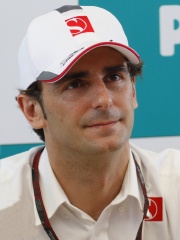
5. Pedro de la Rosa (b. 1971)
With an HPI of 60.34, Pedro de la Rosa is the 5th most famous Spanish Racing Driver. His biography has been translated into 45 different languages.
Pedro Martínez de la Rosa (Spanish pronunciation: [ˈpeðɾo ðe la ˈrosa]; born 24 February 1971) is a Spanish former racing driver, motorsport executive and broadcaster, who competed in Formula One between 1999 and 2012. In Japanese motorsport, de la Rosa won the Formula Nippon Championship and the All-Japan GT Championship, both in 1997. Born and raised in Barcelona, De la Rosa began his career in radio-controlled racing, winning several national and continental titles before moving into karting aged 17. He participated in 107 Grands Prix for the Arrows, Jaguar, McLaren, Sauber and HRT teams. He made his Formula One debut at the 1999 Australian Grand Prix, scoring a point in his first race. He scored a total of 35 championship points, which includes a podium finish at the 2006 Hungarian Grand Prix. He is the first Spanish racing driver to win a National Championship in Japan open-wheel racing history, won the Japanese Super Formula Championship (formerly Formula Nippon Championship) and the Super GT (formerly JGTC) in 1997. Upon retiring from motor racing, de la Rosa became a commentator and pundit for La Sexta, Telecinco, Movistar and DAZN. He founded Drivex in 2005, and served as technical and sporting director of Techeetah in Formula E during the 2018–19 season, winning the Formula E Teams' Championship. He has also been an ambassador for Aston Martin since 2022.

6. Marc Márquez (b. 1993)
With an HPI of 59.52, Marc Márquez is the 6th most famous Spanish Racing Driver. His biography has been translated into 45 different languages.
Marc Márquez Alentà (born 17 February 1993) is a Spanish Grand Prix motorcycle road racer who races for the Ducati Lenovo Team. He previously raced for Honda's factory team from 2013 to 2023, and for the Ducati satellite team Gresini in 2024. Widely considered one of the greatest motorcycle racers of all time, he has won nine Grand Prix World Championships, including seven in the MotoGP class (2013, 2014, 2016, 2017, 2018, 2019, and 2025). As a teenager, Márquez won the 125cc World Championship in 2010, and the Moto2 World Championship in 2012. He moved into the MotoGP class in 2013 to ride for Repsol Honda. He won the title on his debut, becoming the first rider since Kenny Roberts in 1978 to win the premier class title in his rookie season, and the youngest to win it overall, at 20 years and 266 days. He received the Laureus World Sports Award for Breakthrough of the Year following that season. In 2014 Márquez defended his title dominantly, winning the first ten races of the season back-to-back. Márquez was ruled out of championship contention early in 2015 due to a series of crashes, with the season overshadowed by his tumultuous feud with Valentino Rossi. In 2016, at the age of 23, Márquez equalled the all-time Grand Prix record for pole positions. He secured a further four consecutive championships in 2016, 2017, 2018, and a particularly dominant 2019. He became the youngest rider to win his seventh and eighth Grand Prix championships. At the delayed 2020 season-opener in Jerez, Márquez crashed and broke his right arm. A premature attempt to return to competition further damaged the arm, and he sat out most of the season due to three surgeries. The injury continued to plague Márquez in 2021, and despite winning races in Germany, Austin, and Misano, he finished the season seventh. Márquez underwent a more successful fourth surgery on his arm at the Mayo Clinic in 2022. Struggling with an increasingly adrift RC213V, Márquez severed his contract with Honda in 2023 and joined the satellite Gresini Ducati team for 2024. Márquez won his first race for 1,043 days in Aragon with Gresini. He finished the championship in third place and negotiated a factory Ducati contract for 2025. In 2025, Márquez finally recovered full form, and won the championship with 5 races to spare. His six-year drought between titles was the longest in history, and at 32 he became the oldest world champion in the four-stroke era. His younger brother Álex Márquez was runner-up, making them the first siblings to place first and second in the premier class. Márquez's 2025 season was rated by his peers as one of the greatest sporting comebacks of all time.

7. Emilio de Villota (b. 1946)
With an HPI of 59.39, Emilio de Villota is the 7th most famous Spanish Racing Driver. His biography has been translated into 22 different languages.
Emilio de Villota Ruíz (born 26 July 1946) is a Spanish former racing driver, who competed in Formula One between 1976 and 1982. He entered 15 World Championship Grands Prix, qualifying twice. He entered most Spanish Grand Prix between 1976 and 1982 and became a major force in the short-lived British Formula One Championship, winning the title in 1980.

8. Alex Soler-Roig (b. 1931)
With an HPI of 58.73, Alex Soler-Roig is the 8th most famous Spanish Racing Driver. His biography has been translated into 22 different languages.
Alex Soler-Roig i Janer (Catalan pronunciation: [ˈaləks suˈle ˈrɔtʃ]; born 29 October 1931) is a former racing driver from Barcelona, Spain. He participated in 10 Formula One World Championship Grands Prix, debuting on 19 April 1970, and scored no championship points. He also participated in several non-Championship Formula One races.

9. Paco Godia (1921 - 1990)
With an HPI of 57.68, Paco Godia is the 9th most famous Spanish Racing Driver. His biography has been translated into 19 different languages.
Francisco Godia Sales (21 March 1921 – 28 November 1990), better known as Paco Godia, was a Spanish racing driver. He drove intermittently in Formula One between 1951 and 1958, participating in 14 World Championship Grands Prix and numerous non-Championship races. He was the first Spaniard ever to take part in a Formula One Grand Prix.
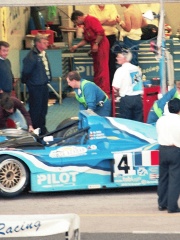
10. Adrián Campos (1960 - 2021)
With an HPI of 56.77, Adrián Campos is the 10th most famous Spanish Racing Driver. His biography has been translated into 28 different languages.
Adrián Campos Suñer (17 June 1960 – 27 January 2021) was a Spanish Formula One driver. He participated in 21 Grands Prix, debuting on 12 April 1987, without scoring a championship point. He later moved into team management, with more success. He was the founder of the Campos Meta Formula One team (later known as HRT), which competed in Formula One from 2010 to 2012. He founded Campos Racing in 1998.
People
Pantheon has 62 people classified as Spanish racing drivers born between 1903 and 2004. Of these 62, 53 (85.48%) of them are still alive today. The most famous living Spanish racing drivers include Fernando Alonso, Carlos Sainz, and Carlos Sainz Jr.. The most famous deceased Spanish racing drivers include Ángel Nieto, Paco Godia, and Adrián Campos. As of April 2024, 11 new Spanish racing drivers have been added to Pantheon including Alberto Puig, Luis Moya, and Jordi Gené.
Living Spanish Racing Drivers
Go to all RankingsFernando Alonso
1981 - Present
HPI: 69.33
Carlos Sainz
1962 - Present
HPI: 68.50
Carlos Sainz Jr.
1994 - Present
HPI: 62.18
Pedro de la Rosa
1971 - Present
HPI: 60.34
Marc Márquez
1993 - Present
HPI: 59.52
Emilio de Villota
1946 - Present
HPI: 59.39
Alex Soler-Roig
1931 - Present
HPI: 58.73
Jorge Lorenzo
1987 - Present
HPI: 56.00
Sito Pons
1959 - Present
HPI: 55.97
Dani Pedrosa
1985 - Present
HPI: 54.47
Marc Gené
1974 - Present
HPI: 54.32
Luis Pérez-Sala
1959 - Present
HPI: 54.04
Deceased Spanish Racing Drivers
Go to all RankingsÁngel Nieto
1947 - 2017
HPI: 65.11
Paco Godia
1921 - 1990
HPI: 57.68
Adrián Campos
1960 - 2021
HPI: 56.77
Antonio Creus
1924 - 1996
HPI: 55.69
Emilio Zapico
1944 - 1996
HPI: 55.66
María de Villota
1980 - 2013
HPI: 55.03
Juan Jover
1903 - 1960
HPI: 53.89
Ricardo Tormo
1952 - 1998
HPI: 52.94
Luis Salom
1991 - 2016
HPI: 44.40
Newly Added Spanish Racing Drivers (2025)
Go to all RankingsAlberto Puig
1967 - Present
HPI: 51.76
Luis Moya
1960 - Present
HPI: 47.22
Jordi Gené
1970 - Present
HPI: 46.64
Nani Roma
1972 - Present
HPI: 46.46
Jesús Puras
1963 - Present
HPI: 45.21
Rubén Xaus
1978 - Present
HPI: 44.41
Axel Pons
1991 - Present
HPI: 44.33
Pedro Acosta
2004 - Present
HPI: 42.18
Miguel Molina
1989 - Present
HPI: 39.73
Ana Carrasco
1997 - Present
HPI: 38.92
Efrén Vázquez
1986 - Present
HPI: 36.87
Overlapping Lives
Which Racing Drivers were alive at the same time? This visualization shows the lifespans of the 9 most globally memorable Racing Drivers since 1700.

